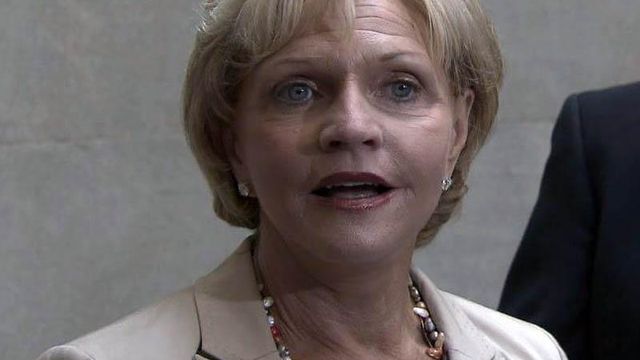NC governor vetoes medical malpractice limits
Democratic Gov. Beverly Perdue vetoed another bill Friday pushed by the Republican majority at the legislature, this time changes to rules governing medical malpractice cases that would have capped certain monetary awards for negligence victims.
Posted — UpdatedPerdue blocked a bill from taking effect that would have limited awards for malpractice victims to $500,000 for non-economic damages. Those damages cover pain, suffering and emotional distress, but they also cover catastrophic injuries like death or brain damage in patients who can't seek compensation for lost earnings, like children and the elderly.
Perdue suggested in her veto message that she would sign into law an amended package if lawmakers developed one when they convene next month.
Perdue spokesman Mark Johnson said separately the governor had problems with the cap in the current bill.
"I commend the legislature for addressing this important issue but, in its current form, the bill is unbalanced," Perdue said in a statement. "I urge legislators to modify the bill when the General Assembly returns in July to protect those who are catastrophically injured."
The veto is a victory for the state's trial lawyers and patients who opposed vigorously any cap on what's called "non-economic" damages – those unrelated to medical bills and compensation for lost wages or income – and a setback for the state's business community and doctors. For years, they have been seeking limits they say would curtail out-of-control malpractice insurance premiums.
Such a cap had been avoided by Democrats when they were in control of the General Assembly in part because the state trial lawyers' association opposed the idea. Leaders of the North Carolina Advocates for Justice have been historically aligned with Democratic interests.
"We applaud the governor for vetoing this bill," said Dick Taylor, the chief executive officer for N.C. Advocates for Justice.
The climate changed when the GOP took charge of both legislative chambers for the first time in 140 years last November. Republican leaders also saw the measure as an economic development tool by attracting doctors to set up shop in North Carolina because of favorable liability laws.
The future of an override vote on this bill is unclear when the legislature begins work again July 13.
"In countless frivolous lawsuits, trial lawyers win big and drive up health care costs for everyone. Yet Gov. Perdue chose to cater to special interests instead of reducing medical costs and improving access to care for all North Carolinians," Senate President Pro Tem Phil Berger said in a statement. "No matter how she spins it, a veto is a veto, and this one deals a severe blow to the state’s medical community and every citizen struggling to cope with the skyrocketing cost of health care.”
The Senate passed the bill by a wide margin, but the House passed the measure by a vote of 62-44, short of the majority that would signal the chamber's ability to cancel Perdue's veto. The House vote wasn't exclusively partisan – 11 Democrats and 11 Republicans voted contrary to the majority in their respective parties on the final compromise.
The North Carolina Medical Society and North Carolina Hospital Association said in a joint statement they want lawmakers to override Perdue's veto, saying the bill already was a careful compromise.
"The governor does not get the last word on medical liability reform," N.C. Medical Society chief executive Bob Seligson said, adding the "General Assembly developed a strong bipartisan bill that will reduce health care costs, protect patients and encourage job growth."
Perdue signs other bills
The governor signed 24 other bills on Friday, including changes to the state's workers compensation program and tort reform. She called both measures "good, balanced laws."
The tort reform bill would "protect those injured and also prevent undue or disproportionate penalties from being imposed upon our companies," she said. Meanwhile, the workers compensation changes "extend protections to injured people and also provide guidelines and protections for employers."
• Credits
Copyright 2024 by WRAL.com and the Associated Press. All rights reserved. This material may not be published, broadcast, rewritten or redistributed.






